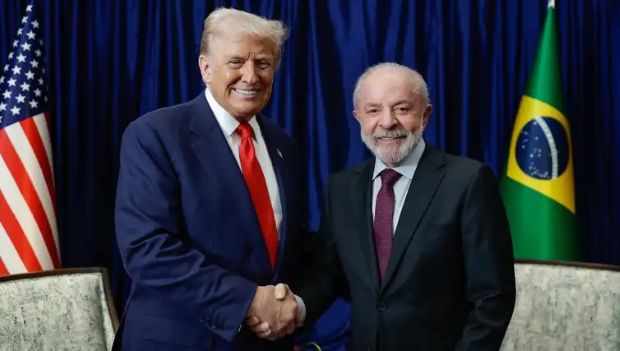Brazilian Tropical Revolution and American multinational Agribusiness spoke louder
Publicado em 30/10/2025
Divulgação Donald Trump and Lula
Donald Trump and Lula
Published on 10, October2025
Agriconscient Show – Broadcast by Radio Eldorado / Estadão
*José Luiz Tejon
Translated / Copydesk by Teacher Francisco Bardhal Barbosa
The meeting between Trump and Lula revealed that the world's largest economy, the United States, with a GDP of around $30 trillion, is entirely driven by multinational corporations that depend on multilateral markets. This is true both for their supply chains, as is evident with products like coffee, citrus, sugar, and cocoa, and also for products beyond tropical ones, such as meats, animal proteins, eggs, fruits, leather, beans, rice, and more, covering everything from the "A" in avocado to the "Z" in zebu cattle.
This reliance isn't just to supply the U.S. domestic market, where tariff hikes have led to increased prices for American consumers, but also for their supply chains, where U.S. industry, commerce, and services add value to sell to global markets.
On the Brazilian side, the tropical revolution we´ve accomplished over the last 50 years has positioned us as a developing economy with a GDP of just over $2.1 trillion. However, when we look at the world from the perspective of the planet's tropical zone, the nations, economies, and societies located between the Tropics of Cancer and Capricorn, Brazil is the greatest power, nowadays the world's largest Agribusiness exporter and has all the conditions to double in size over the next 10 years.
Therefore, we represent a country with a major leading role, not only in serving American interests, such as supplying its domestic consumers, but also as an important nation for the objectives of U.S. multinationals in global competition. This is true both in science and "pre-farmgate" technologies, as well as in the post-farmgate agri-industrialisation.
In this sense, Brazil's strategy as a tropical power aligns with the strategic competitive needs of the United States, which now sees China as its legitimate competitor.
On the other hand, for China, Brazil's largest customer, the astuteness of a player at the international stakes table, which is Donald Trump's expertise, undoubtedly came into play.
The prevailing rapport between two good salesmen overcame minor ideological factors and has reestablished Brazil-U.S. dialogue under a strategic and completely "business-oriented" command.
Over the past fifty years, Brazil’s Tropical Power has grown alongside China, now the new global economic powerhouse, holding a GDP of around $19 trillion. This partnership has reshaped the playing field at the “ world’s casino business table”, where strategies aimed at winning and timing can influence outcomes, as demonstrated by leaders like Donald Trump, who likes to win and knows how to play the game. Undoubtedly, the charisma of President Lula, as an excellent salesman, helped, as he and Trump relied on mutual liking and empathy.
From what I’ve gathered, there is a clear vision for strategic negotiation that will be crucial for both the United States and Brazil.
*Prof.Dr.José Luiz Tejon - PhD in Education Universidad de La Empresa/Uruguay; Academic Director Brazil+Tropical Belt Nations at International Agribusiness MBA Audencia France & Fecap Brazil; Master's degree in Art Education and History of Culture - Mackenzie University; Journalist and Publicist - Harvard, MIT and PACE/USA/ Insead in France; Specialization Academic Coordinator of Master's Science Food & Agribusiness Management at Audencia in Nantes/ France, and FECAP/Brazil; Managing Partner at Biomarketing and TCA International; Professional Head at Agri Anefac; Writer, author and co-author of 37 books; Agri Personality Award 2023/ABAG -100 Most Influential People in Agribusiness; Former director of Grupo Estadão, Agroceres and Jacto S/A; 2025 Award Agriworld Group.
